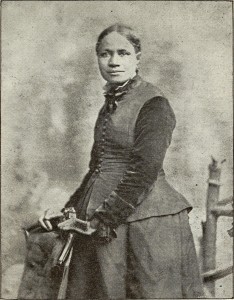Moving Toward Freedom
March 31, 2016Frances Ellen Watkins Harper was born a free Black woman in Baltimore, Maryland in 1825. She was raised in the household of her uncle, an educator and African Methodist Episcopal (AME) minister. He was also an abolitionist—a person who objected to the enslavement of blacks. Harper became an educator and abolitionist as well. She also became a writer, publishing her first book of poetry at twenty and later in life publishing the first short story by an African American woman. Her writing often urged Blacks, women, and people in oppressed groups to take a firm stand for equality and freedom.
In 1850, the Fugitive Slave Act was passed. It became dangerous to be a free Black in Maryland because slave owners could claim Black people were runaway slaves and force them into slavery. So, Harper moved farther north to Ohio and then to Philadelphia. She taught, ran part of the Underground Railroad helping slaves escape to freedom, and lectured around the country.
In 1863, abolitionists celebrated success with the passage of the Emancipation Proclamation, which freed the slaves. But there was a long road ahead to full equality, and Harper spent the rest of her life working for women as well as African Americans to have access to full freedom and justice.
To read some of Harper’s poems click here.
About
Quest for Meaning is a program of the Church of the Larger Fellowship (CLF).
As a Unitarian Universalist congregation with no geographical boundary, the CLF creates global spiritual community, rooted in profound love, which cultivates wonder, imagination, and the courage to act.
Contact
Church of the Larger Fellowship Unitarian Universalist (CLFUU)
24 Farnsworth Street
Boston MA 02210

